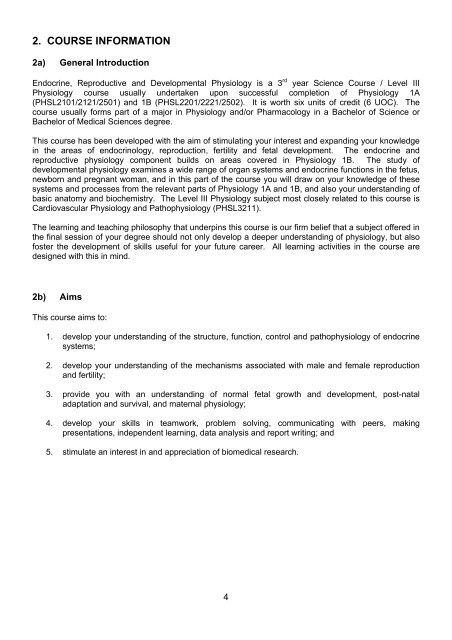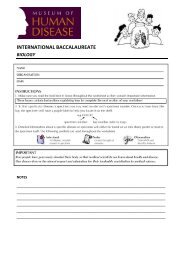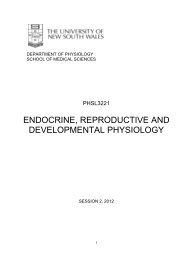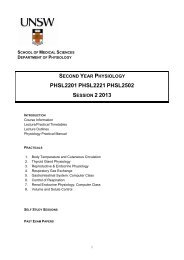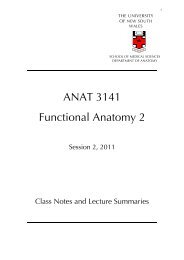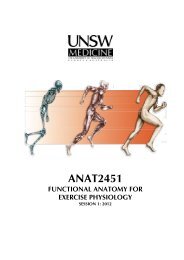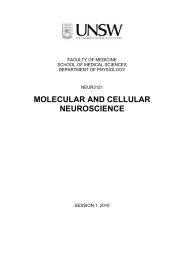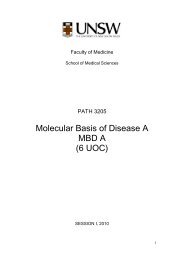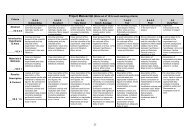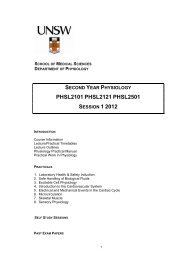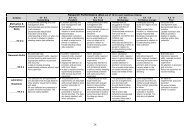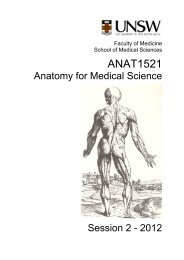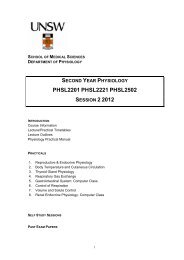endocrine, reproductive and developmental physiology - School of ...
endocrine, reproductive and developmental physiology - School of ...
endocrine, reproductive and developmental physiology - School of ...
You also want an ePaper? Increase the reach of your titles
YUMPU automatically turns print PDFs into web optimized ePapers that Google loves.
2. COURSE INFORMATION<br />
2a) General Introduction<br />
Endocrine, Reproductive <strong>and</strong> Developmental Physiology is a 3 rd year Science Course / Level III<br />
Physiology course usually undertaken upon successful completion <strong>of</strong> Physiology 1A<br />
(PHSL2101/2121/2501) <strong>and</strong> 1B (PHSL2201/2221/2502). It is worth six units <strong>of</strong> credit (6 UOC). The<br />
course usually forms part <strong>of</strong> a major in Physiology <strong>and</strong>/or Pharmacology in a Bachelor <strong>of</strong> Science or<br />
Bachelor <strong>of</strong> Medical Sciences degree.<br />
This course has been developed with the aim <strong>of</strong> stimulating your interest <strong>and</strong> exp<strong>and</strong>ing your knowledge<br />
in the areas <strong>of</strong> endocrinology, reproduction, fertility <strong>and</strong> fetal development. The <strong>endocrine</strong> <strong>and</strong><br />
<strong>reproductive</strong> <strong>physiology</strong> component builds on areas covered in Physiology 1B. The study <strong>of</strong><br />
<strong>developmental</strong> <strong>physiology</strong> examines a wide range <strong>of</strong> organ systems <strong>and</strong> <strong>endocrine</strong> functions in the fetus,<br />
newborn <strong>and</strong> pregnant woman, <strong>and</strong> in this part <strong>of</strong> the course you will draw on your knowledge <strong>of</strong> these<br />
systems <strong>and</strong> processes from the relevant parts <strong>of</strong> Physiology 1A <strong>and</strong> 1B, <strong>and</strong> also your underst<strong>and</strong>ing <strong>of</strong><br />
basic anatomy <strong>and</strong> biochemistry. The Level III Physiology subject most closely related to this course is<br />
Cardiovascular Physiology <strong>and</strong> Patho<strong>physiology</strong> (PHSL3211).<br />
The learning <strong>and</strong> teaching philosophy that underpins this course is our firm belief that a subject <strong>of</strong>fered in<br />
the final session <strong>of</strong> your degree should not only develop a deeper underst<strong>and</strong>ing <strong>of</strong> <strong>physiology</strong>, but also<br />
foster the development <strong>of</strong> skills useful for your future career. All learning activities in the course are<br />
designed with this in mind.<br />
2b) Aims<br />
This course aims to:<br />
1. develop your underst<strong>and</strong>ing <strong>of</strong> the structure, function, control <strong>and</strong> patho<strong>physiology</strong> <strong>of</strong> <strong>endocrine</strong><br />
systems;<br />
2. develop your underst<strong>and</strong>ing <strong>of</strong> the mechanisms associated with male <strong>and</strong> female reproduction<br />
<strong>and</strong> fertility;<br />
3. provide you with an underst<strong>and</strong>ing <strong>of</strong> normal fetal growth <strong>and</strong> development, post-natal<br />
adaptation <strong>and</strong> survival, <strong>and</strong> maternal <strong>physiology</strong>;<br />
4. develop your skills in teamwork, problem solving, communicating with peers, making<br />
presentations, independent learning, data analysis <strong>and</strong> report writing; <strong>and</strong><br />
5. stimulate an interest in <strong>and</strong> appreciation <strong>of</strong> biomedical research.<br />
4


